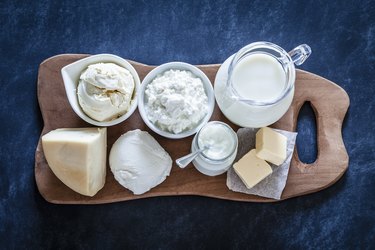
If you have a persistent cough, chest congestion, or chronic obstructive pulmonary disease (COPD), an anti-mucus diet can help ease some of your symptoms. It will eliminate mucus-building substances, keep existing mucus from thickening, stop overproduction of mucus, and let you breathe easier.
According to Harvard University, mucus is a natural substance that bodies produce to help get rid of potentially harmful microbes. While some mucus production in the body is healthy, too much can hurt. For example, people with asthma produce too much mucus in the lungs, which can be dangerous. Furthermore, the Lung Health Institute recommends that patients with COPD change their diets to limit mucus production in the lungs.
Video of the Day
Video of the Day
Even if you do not have a chronic disorder of the lungs or airways, you may wish to learn which foods to avoid during a cough with phlegm. Viral and bacterial infections can cause increased mucus production that is uncomfortable or downright painful.
Read more: Natural Ways to Thin Mucus
The Truth About Dairy Products
When many people think of foods to avoid with chest congestion, dairy products are the first to come to mind. For example, parents often limit milk intake for sick children. While the belief that milk, cheese and ice cream increase mucus production remains popular in households across the country, the scientific data is mixed.
The Lung Institute recommends that patients with COPD who produce excess mucus in the lungs avoid dairy products, including butter, yogurt, milk, cheese and ice cream. Furthermore, a September 2018 study in the Laryngoscope found that patients who previously complained of having too much mucus reported worsening symptoms after consuming dairy products. Meanwhile, subjects on dairy-free diets saw a significant reduction in symptoms.
On the other hand, some researchers report that the connection between milk and mucus production is primarily a myth. The Archives of Disease in Childhood published a 2018 review of the scientific evidence of this connection which found that dairy does not cause increased mucus production in most people. However, some of the studies evaluated in this review may miss the problems that dairy causes within specific populations, such as those with asthma, COPD or lactose intolerance.
Read more: Should You Cut Dairy From Your Diet?
Foods That Increase Histamine Production
Histamines are natural chemicals in the body that increase when your body believes it is under attack from bacteria, viruses or allergens. Increased histamine production causes many of the symptoms that people associate with the common cold, including runny noses. Some foods tend to increase histamine in the body, such as:
- Pickled foods like sauerkraut
- Smoked meats
- Nuts
- Highly processed foods with many additives
- Beans
- Vinegar
- Chocolate
- Some dairy products
- Some preservatives
If you have an allergic reaction or intolerance to any other kind of food, this can increase histamine in your body as well, since your body reacts to it as a threat to your health. Keeping a diary of your food intake and subsequent symptoms may allow you to notice patterns that help you identify your unique triggers.
If you believe you have a food allergy, talk to your doctor. Medical professionals can help determine which foods bother you, and prescribe life-saving medication if needed. Furthermore, an understanding of your body's needs will help you know which food to avoid during a cough with phlegm.
Read more: What Are the Causes of Mucus in the Lungs?
Caffeine, Alcohol and Cigarettes
While it's important to know what foods to avoid with chest congestion, food is not the only culprit in phlegm overproduction. For example, the Lung Health Institute reports that caffeine can lead some bodies to produce more thick mucus. Anyone worried about mucus in the chest should avoid energy drinks, coffee, and black tea.
Alcohol is one of the histamine-producing substances that you should avoid if you feel like you have too much mucus production. Furthermore, alcoholic beverages can cause the membranes within your nose to swell. While this swelling does not increase mucus production, it can make breathing more difficult.
While many people closely associate cigarettes with lung cancer, it is just one of many respiratory disease that smoking can cause. According to the National Institutes of Health, exposure to cigarettes and other tobacco smoke is the leading cause of COPD in the United States. This disorder causes an overproduction of mucus in the lungs, among other symptoms. Smoke can also increase histamines as the body tries to get rid of the irritant.
- Harvard University: "All About That Mucus: How it Keeps Us Healthy"
- Lung Health Institute: "4 Foods to Avoid If You Want to Decrease Mucus Production"
- Mayo Clinic: "Asthma"
- Wiley Online Library: The Laryngoscope: "Effect of a Dairy Diet on Nasopharyngeal Mucus Secretion"
- Lung Institute: "21 Foods That Trigger Mucus Production (and 21 Foods That Reduce It)"
- BMJ: "Milk, Mucus and Myths"
- KidsHealth From Nemours: "Definition: Histamine"
- Histamine Intolerance Awareness: "The Food List"
- Mayo Clinic: "Nonallergic Rhinitis"
- National Heart, Lung and Blood Institute: "COPD"
- Lung Institute: "Anti-Mucus Diet: How to Know What to Eat and What to Avoid"
- MedlinePlus: Food Allergies